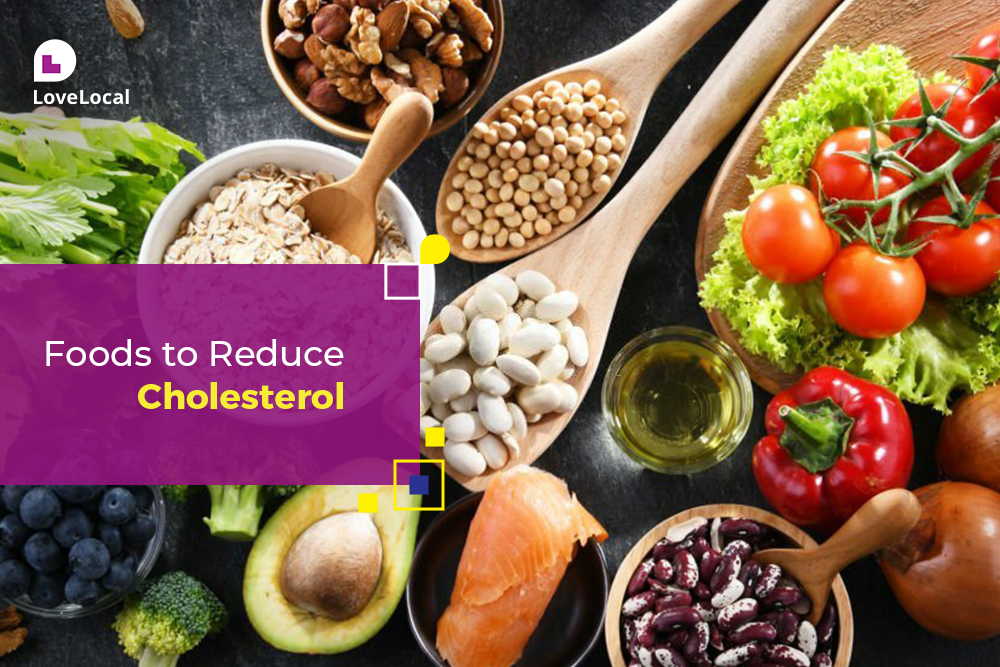Our heart is the engine that keeps our body running smoothly, and maintaining its health is crucial for a long and vibrant life. Taking care of your cholesterol levels is an important part of keeping your heart healthy. High cholesterol can lead to atherosclerosis, a condition where arteries become narrow and can eventually result in heart disease. The good news is that eating healthy foods to reduce cholesterol and a diet can play a significant role in keeping cholesterol levels in check.
List of foods to lower cholesterol
1. Oats and Barley: The Power of Soluble Fiber
One of the most effective strategies for maintaining a low-cholesterol diet is by incorporating foods rich in soluble fiber into your meals. Oats and barley stand out as excellent sources of soluble fiber, actively working to reduce the absorption of cholesterol into the bloodstream. Kickstart your day with a hearty bowl of oatmeal or enhance your soups and stews by adding barley, thus boosting your soluble fiber intake for a heart-healthy approach to nutrition.
2. Fatty Fish: Omega-3 Fatty Acids for Heart Health
Incorporating foods to reduce cholesterol such as fatty fish like salmon, mackerel, and trout are packed with omega-3 fatty acids, known for their heart-protective benefits. Omega-3 benefits lower blood pressure, reduce inflammation, and decrease triglyceride levels. Aim to include fatty fish in your diet at least twice a week to enjoy these cardiovascular perks.
3. Nuts and Seeds: Heart-Healthy Snacking
Almonds, walnuts, flaxseeds, and chia seeds are not only delicious but also powerful natural ways to lower cholesterol. Rich in monounsaturated and polyunsaturated fats, these nuts and seeds can effectively reduce bad cholesterol (LDL) levels. Moreover, they contain plant sterols, natural compounds that naturally compete with cholesterol absorption, providing an extra layer of support for heart health. Incorporate these heart-healthy options into your snacks—whether you munch on a handful of nuts or sprinkle seeds on your yogurt or salads, it’s a flavorful and natural way to give your heart the boost it deserves.
4. Olive Oil: A Mediterranean Gem
Olive oil, a key player in the lineup of foods to reduce cholesterol, is a heart-healthy choice due to its high content of monounsaturated fats. These fats have been shown to lower LDL cholesterol while maintaining or even increasing levels of high-density lipoprotein (HDL) cholesterol—the good kind. Use extra virgin olive oil in cooking and dressings to add a flavorful touch to your meals.
5. Fruits and Vegetables: Natural foods to reduce Cholesterol
Embracing a diet rich in fruits and vegetables is not only a feast for the taste buds but also a boon for heart health. Fruits to lower cholesterol are like Berries, apples, citrus fruits, leafy greens, and cruciferous vegetables like broccoli and Brussels sprouts are among the best foods to lower cholesterol. Packed with fiber, antioxidants, and phytosterols, these nutritional powerhouses actively contribute to maintaining optimal cholesterol levels and supporting overall cardiovascular well-being.
6. Beans and Legumes: Protein-Packed and Cholesterol-Lowering
Beans, lentils, and other pulses are excellent foods to reduce cholesterol, serving as fantastic sources of plant-based protein and soluble fiber. The combination of protein and fiber found in these beans helps lower cholesterol levels, offering a satisfying alternative to meat. Consider incorporating beans into soups, salads, or main dishes for a delicious and heart-healthy protein boost.
7. Dark Chocolate: Indulge in Moderation
Yes, you read it right—dark chocolate can be a part of a heart-healthy diet! Dark chocolate contains antioxidants called flavonoids, which have been linked to enhancing heart health. Opt for cholesterol-lowering drinks, ensuring they contain dark chocolate with a minimum of 70% cocoa content, and savor them in moderation as a delightful occasional treat.
Why it is important to reduce cholesterol in the body.
1. Heart Disease Prevention:
Including foods to reduce cholesterol in your diet is essential in combating high levels of LDL cholesterol, which can lead to the accumulation of plaque in the arteries, a condition known as atherosclerosis. This buildup narrows and stiffens the arteries, reducing blood flow to the heart. If a plaque ruptures, it can affect a blood clot, leading to a heart attack or stroke. By actively incorporating cholesterol-lowering foods, the risk of atherosclerosis and related cardiovascular events is significantly lowered.
2. Maintaining Arterial Health:
Elevated cholesterol levels contribute to the formation of arterial plaques, which can hinder the flexibility and function of blood vessels. Incorporating ways to reduce cholesterol is crucial in this context. Healthy arteries are essential for proper blood circulation, and reducing cholesterol helps prevent the narrowing and hardening of these vessels, promoting overall cardiovascular well-being.
3. Preventing Stroke:
Atherosclerosis not only affects the arteries supplying the heart but can also impact blood vessels leading to the brain. Reduced blood flow to the brain can result in a stroke, and managing cholesterol is crucial in preventing these potentially life-threatening events.
4. Supporting Overall Health:
Beyond its impact on the cardiovascular system, maintaining healthy cholesterol levels has broader health benefits. It contributes to the overall well-being of the body, supporting organ function and reducing the risk of various diseases associated with high cholesterol, such as diabetes. Adopting a low-cholesterol diet plan further enhances these positive effects, creating a holistic approach to health and wellness.
5. Quality of Life Improvement:
Cardiovascular diseases can significantly impact an individual’s quality of life. By taking steps to reduce cholesterol, individuals can enhance their energy levels, maintain physical vitality, and reduce the likelihood of experiencing debilitating health issues associated with heart disease.
Conclusion
A heart-healthy journey involves embracing a diet abundant in foods to reduce cholesterol, such as soluble fiber, coupled with regular exercise. Green tea emerges as a cholesterol-friendly drink, while garlic not only adds flavor but also brings potential cholesterol-lowering benefits to your meals. It’s crucial to steer clear of saturated fats, and incorporating onions, with their quercetin content, further contributes to overall heart health.
For sustainable living, consider incorporating LoveLocal for shopping, supporting local businesses, and fresh produce, adding another layer of cholesterol-conscious choices to your lifestyle. Consistency in these habits forms the cornerstone of lasting cardiovascular well-being, promoting a holistic approach to cholesterol management.
Download the app
Frequently Asked Questions:
To quickly lower cholesterol, focus on incorporating soluble fiber-rich foods into your diet. Oats, beans, fruits, and vegetables are excellent choices. Additionally, incorporating regular physical activity, such as brisk walking or jogging, can help boost HDL (high-density lipoprotein) cholesterol, the “good” cholesterol, and promote overall heart health.
Green tea is a beverage known for its potential to lower cholesterol levels. It contains antioxidants called catechins, which may contribute to reducing LDL (low-density lipoprotein) cholesterol. Drinking green tea regularly, along with a balanced diet, can be a delicious and heart-healthy choice to help manage cholesterol.
Yes, garlic has been associated with lowering cholesterol levels. It contains allicin, a compound with potential cholesterol-lowering properties. While the impact may not be dramatic, regularly incorporating fresh garlic into your meals or considering garlic supplements (after consulting with a healthcare professional) can contribute to overall heart health.
Choosing a diet rich in foods to reduce cholesterol is paramount for cardiovascular health. It’s essential to steer clear of items high in saturated and trans fats, including processed foods, fried delights, fatty cuts of meat, full-fat dairy products, and commercially baked goods. These dietary adjustments play a crucial role in lowering LDL cholesterol levels and mitigating the risk of cardiovascular issues.
Yes! Onions are indeed good for cholesterol. These flavorful bulbs are considered foods to reduce cholesterol due to their quercetin content—a powerful flavonoid with potential heart-protective properties. While the impact of onions alone may be modest, incorporating them into a well-rounded, heart-healthy diet, alongside other fruits and vegetables, can significantly contribute to maintaining healthy cholesterol levels.



